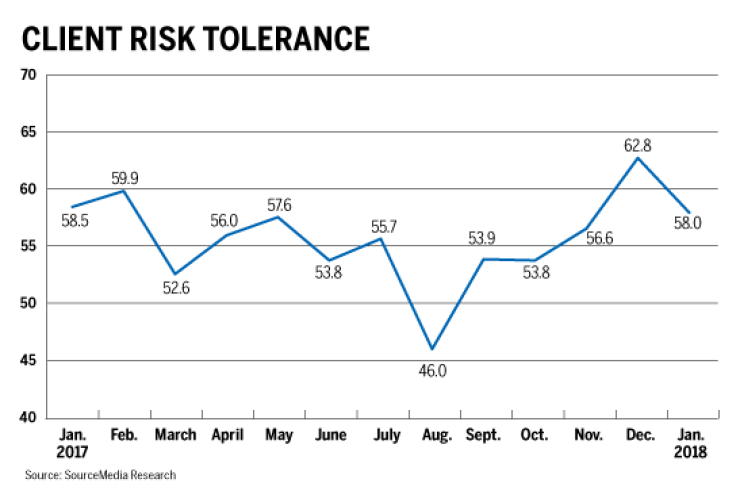Unease that low volatility in the stock market would inevitably give way has helped curb gains in client risk tolerance, advisors say.
Risk appetite remains healthy overall, according to the latest Retirement Advisor Confidence Index – Financial Planning’s monthly survey of wealth managers. But the component tracking client risk tolerance slipped 4.9 points to 58. Readings above 50 indicate an increase, while readings below 50 indicate a decline.

“Folks are more nervous than last year,” one advisor says, backing colleagues who believe that steady, consistent growth in equity values had worked to numb clients to the prospect of setbacks or worse. Clients had started “to forget about corrections and bear markets,” another advisor says.
The chill is particularly sharp among clients who will soon need to tap into savings, according to another advisor who says that “people near retirement age are more skeptical” and fearful of a “potential correction.”

Despite the widespread view that low productivity growth and incipient signs of inflation hurt the case for sky-high stock multiples, advisors express confidence that the economy is still fundamentally on solid footing, and say they are urging clients to look beyond recent stock market gyrations.
“Our view is that, in this phase of the economic cycle, we should be prudent and slow to act and react,” one advisor says.
Advisor perspectives on the tax cut legislation enacted in December are mixed. The package stands to boost corporate profits, add upward pressure to interest rates by stimulating an economy already operating near capacity and impact the personal finances of individual clients differently. One advisor says the tax law has created uncertainty and that assessing its effect involves “too many unknowns.”
With the dip in the risk tolerance component, the composite RACI was held to a gain of 0.9 points to 58. That reading is still well into expansion territory and indicates that business conditions for wealth managers remain quite favorable. The composite tracks asset allocation, investment product selection and sales, client risk tolerance and tax liability, new retirement plan enrollees and planning fees.

The cash allocation component increased 1.3 points to 55.1, suggesting that clients are adding to their defenses against adverse moves in stock prices. One advisor says that “moving forward harvesting gains and protecting gains made over the last five years will be the primary objective by the end of 2018.”

Above all, however, advisors say they are counseling clients to keep their portfolios balanced according to long-term plans. While the equity allocation component dipped 1.7 points, it still remained high, at 64.7.
The index component tracking fees charged for retirement services continued to buoy the broad picture for wealth managers, gaining 0.7 points to 58.3.
